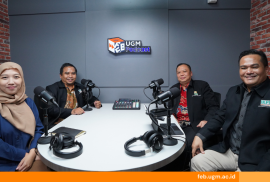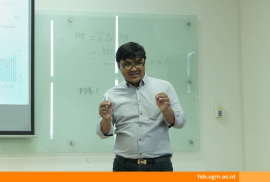In today’s digital age, making the right financial decisions has become even more important, especially with increased access to various investment options that offer both potential returns and varying levels of risk. Therefore, understanding how to invest wisely is critical to achieving financial stability in the future.
The workshop, titled ‘Financial Planning’, will feature a series of experts from CIMB Niaga, a leading name in the field of banking, finance, and investment. These professionals will share their insights and strategies, giving the academic community a unique opportunity to learn from the best. The offline event on Friday, 20 September 2024 at Djarum Hall FEB UGM, is a collaborative effort between the Career and Student Development Unit (CSDU) FEB UGM and CIMB Niaga.
CIMB Niaga’s Wealth Research Senior Specialist, Hanintyo, emphasized the importance of investment. According to him, investment is something that needs to be forced. Moreover, investment needs to be done immediately, especially when the price of investment instruments is reasonable.
“The best time to invest is today, then tomorrow. While we are still young, don’t hesitate to start investing,” Hanintyo said on Friday (9/20).
He explained that there are four principles to consider when investing. These four principles are intention, discipline, starting with a small amount, and being friendly with time. Regarding the last two principles, he explained that one can begin investing with a small amount and then increase as one’s income grows.
“Don’t delay! Start investing today because the longer you put it off, the harder it is to get started,” he emphasized.
In addition, Hanintyo also discussed the concerns of some people who feel there is still time to invest. However, he stressed that it is never too late to invest.
“It may be quite late for those approaching retirement because investment instruments that can generate profits quickly are minimal. But for those who are young, there is still plenty of time to start,” Hanintyo explained.
He also emphasized that how we handle money is very much up to us. Being rich is not only about how much you earn but how much you can save and invest. “The problem of money comes from us; whether we feel enough, lack, or want more, it comes from us. As for luck, it only comes to those who work smart. That is why we need to know when to start investing so that we can reap the rewards in the future,” he explained.
Banks also play a central role in providing various financial services and influencing investment decisions. CIMB Niaga’s Head of Capital & Balance Sheet Management, Roy Bahren Siregar, took the opportunity to explain the different types of banks, such as central banks, whose functions are performed by Bank Indonesia, conventional or commercial banks, and rural banks (BPR). The differences between these three types of banks also affect their functions. For example, BPRs focus on providing services to small and medium enterprises (MSMEs), while conventional banks have broader functions, such as foreign exchange deposit services.
“The banking industry has limitations or restrictions on expansion. These limitations and restrictions are due to restrictions from the OJK and also limited capital (CAPEX),” he explained.
Roy added that although banks have their functions, the current banking industry cannot be as conservative as it used to be. With the development of technology, the banking industry must also adapt. In addition, Roy also highlighted the importance of technological adaptation in the banking world, considering that more and more banking services are now moving to digital platforms. “Now, banks also need to develop their digital services, one of which is through application development. This is done because the scope of the bank’s work is becoming broader, not only for savings and loans and transactions,” he said.
In his speech, FEB UGM’s Vice Dean for Finance, Assets and Human Resources, Suyanto, M.B.A., Ph.D., emphasized the importance of sound financial management. Financial management is critical when the cost of living is increasing. “For all married and unmarried attendees, this knowledge is useful daily. Moreover, the cost of living, including the cost of living in Jogja, is increasing. We need to maintain our interests and priorities to achieve our life goals,” he said.
This seminar not only strengthens the financial and investment literacy of the FEB UGM academic community. This activity also contributes to the achievement of several Sustainable Development Goals (SDGs), such as quality education (SDG 4), decent work and economic growth (SDG 8), innovation and infrastructure (SDG 9), and partnerships to achieve goals (SDG 17).
Reportage: Najwah Ariella Puteri
Editor: Kurnia Ekaptiningrum
Sustainable Development Goals








